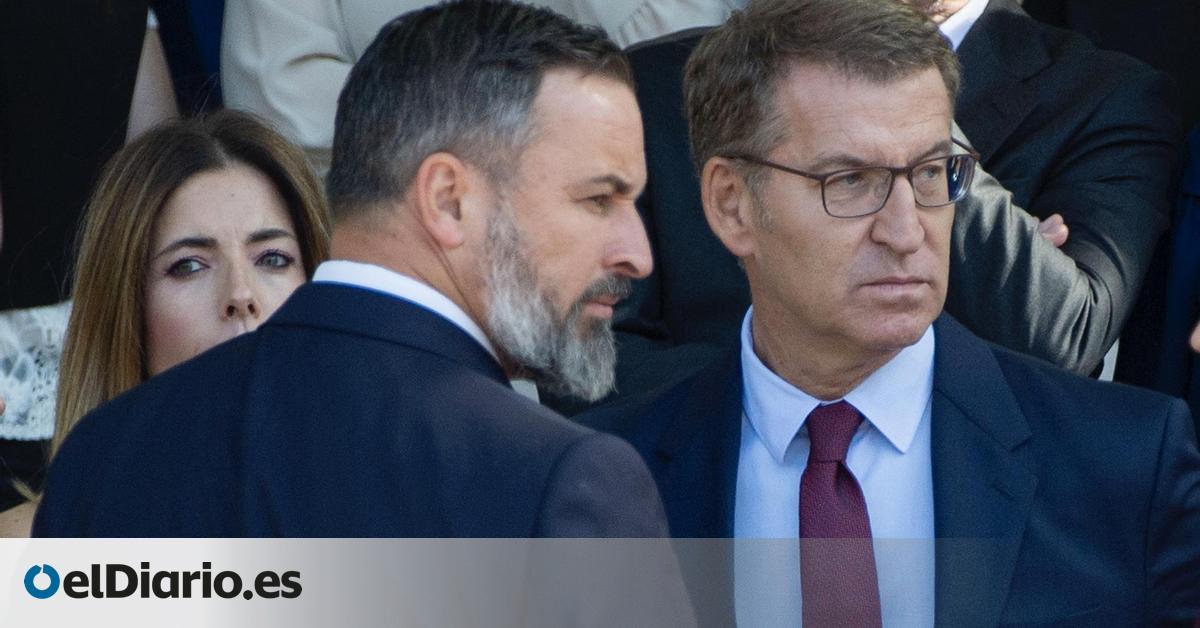
Neither unity nor unanimity. The decision taken this Thursday by the National Executive Committee of Vox to break the Government pacts with the PP in all the autonomous communities, with the excuse that they are not willing to accept the distribution of a tiny number of migrant minors arriving alone in the Canary Islands, has once again shaken the foundations of the far-right party. The party is experiencing an internal division that Santiago Abascal is trying to minimize but whose consequences are still unknown.
The decision to break with the PP was immediately followed by the insubordination of the only Vox councillor in the Extremadura government: Ignacio Higuero, who announced that he was resigning from the party to remain in María Guardiola’s Executive occupying the same portfolio of Forest Management and Rural World. “You called me the Vox councillor and now I am the councillor of the Junta de Extremadura,” he concluded in an appearance before the press supported by Guardiola herself.
But Higuero is not the only one who has openly expressed his discontent with the challenge thrown by Abascal. The discomfort extends to some other officials who felt comfortable governing with the PP, such as the Minister of Industry, Commerce and Employment of Castilla y León, Mariano Veganzones, who, as ABC has reported, although he is leaving Mañueco’s Government, has communicated to Vox his decision to abandon his membership in the party. His colleague and Minister of Culture, Gonzalo Santonja, has decided to keep up with Abascal and this Friday confirmed that he was not going to resign with the argument that the PP had asked him to stay in the portfolio. The now former vice president of the Junta, Juan García-Gallardo, acknowledged in an appearance called to announce that he was leaving that “his wish” was for all the other ministers to resign, “but it is a personal decision.” “Everyone will act according to their own value system,” he said.
What will happen now? is the question that many in Vox are asking themselves. “There is concern about the loss of institutional power and many of us would like to know why it is breaking up now and not before,” one of the critical voices in Vox assures elDiario.es, who recalls the numerous grievances they have suffered from the PP and from Alberto Núñez Feijóo himself. These grievances, in his opinion, should have led to this divorce earlier. Among other things, he mentions that the leader of the PP “tried to prevent” them from running in Galicia, or the fact that he has been “ignoring and insulting” them in all the campaigns. That, adds this critical voice, not to mention the “disloyalty” that he believes Feijóo’s party has shown with the amnesty law and their double talk: “They were screaming to the heavens while they were making pacts with the socialists in Europe and sharing out the institutional bodies here.”
There are even those who go further and believe that Abascal has behaved like a “Caesar” imposing his criteria, “as he often does.” In the opinion of this former party leader, the logical thing would have been that the decision would have been taken in a “calm” manner with all the councillors and regional officials involved, without such haste. Abascal, however, launched into threats to break the pacts several days before materialising the idea. The first time he sent serious warnings to the PP if it accepted the distribution of immigrant minors in those territories was last Monday, after the meeting with the Political Action Committee, where the issue was already raised but no firm decision was made. However, the leader of Vox had already left some phrases in that sense much earlier. That Monday, in an appearance at the party headquarters, he stated: “We will abandon those governments immediately. We will not be complicit in robberies, machetes or rapes.” In the following days he continued to insist on the same idea until this Thursday night he made it official after meeting with the national leadership.
That the meeting was tense and that there were various dissenting voices has become clear. According to Vox sources consulted by this editorial team, the decision was submitted to the Executive for approval and the consultation ended with “almost 90% support” from those present. That is, there was at least 10% who did not support it. Even Abascal himself, in an interview given this Friday to Telecinco, admitted that during the four hours that the conclave lasted – which was the reason why he delayed his appearance, initially scheduled for eight in the evening – there was an intense debate and “different positions” although in the end the resolution was taken “by majority” and in a “collective” way, because Vox, according to Abascal, “is not a North Korean party”.
Concern about the loss of institutional power
The main concern now is, on the one hand, this loss of institutional power just when Vox most needed political visibility when faced with a competitor like the ultra-initiative Alvise Pérez, leader of Se Acabó La Fiesta, who already caused them a breach in the recent European elections. And he could cause them another if one of the PP barons decides to call elections in their autonomous communities, something that Feijóo’s people seem to rule out. But, on the other hand, there is the personal situation in which the members who leave those Governments that they maintained with the PP are left. Not all of them are parliamentarians, like the Ministers of Agriculture and Industry of Castilla y León, Gerardo Dueñas and Mariano Veganzones, who have been dismissed and have left Vox. Their colleague Gonzalo Santonja, who also has no seat, remains at the head of the Ministry of Culture in a solo PP government. And the current vice president of Castile and Leon, García Gallardo, will become a member of the opposition, although he will be the group’s spokesperson in the regional Parliament.
The three Valencian ministers of Vox, the first vice-president and responsible for Culture and Sport, Vicente Barrera; the minister of Justice and Interior, Elisa Núñez, and the minister of Agriculture, Livestock and Fisheries, José Luis Aguirre, who were not deputies either, have been dismissed by the president, Carlos Mazón. In Murcia, the only one who has a seat in the Assembly is José Ángel Antelo, who, obeying Abascal, resigned this Friday as vice-president of the Government and will almost certainly be named spokesperson for the parliamentary group. The minister of Public Works, José Manuel Pancorbo, on the other hand, is left with nothing and will foreseeably return to his job as an engineer.
In Aragon, the current Vice President of the Government, Alejandro Nolasco, is a member of parliament, and so he retains his seat. However, the Minister for Agriculture, Ángel Samper, was not, and so he is no longer in office.
Abascal’s version is that none of the former regional vice presidents who attended the meeting of the National Executive Committee on Thursday “showed attachment to their positions.” “They displayed a heroic and dignified position and are people of great humanity.” The question is whether the party’s leadership will now reward them in some way for their ‘sacrifice’ with some extra bonus. However, the economic damage is not only for these public officials, but collaterally affects the people they signed for their teams, who will foreseeably be fired or, if they are lucky, accommodated in other departments. People who, according to Abascal, “in many cases, had left their jobs, who had taken a step forward and who after only one year of government, find themselves outside of those responsibilities and probably with difficult personal situations.” However, the leader of Vox has boasted that decisions in his party “are not made by seats, but by principles.”
Despite this apparent “understanding” by those who did not agree with the decision, criticism against the first dissidents has not been long in coming. The MEP and head of the delegation in Brussels, Jorge Buxadé, attacked this morning the Extremaduran Ignacio Higuero for deciding to remain in office despite the order to break away given by the national leader. Buxadé admitted in an interview on La Hora de la 1, on TVE, that there was “a possibility that some of the councillors could remain glued to the chair and not defend the values of Vox” although “the decision was to leave the governments”. “I understand that they stay. From a personal point of view we can understand it, although not from a political point of view”. But both he and Abascal have made it clear that the dissidents will be expelled “immediately” from the party. “If those people stay, they will not be from Vox”, the leader of the extreme right sentenced.
Throughout these days, Abascal has been trying to justify his risky gamble of breaking definitively with the PP by insisting that “illegal immigration is a problem for security on the streets. It is an economic problem, for social services, for health care, and for regional budgets.” “It is not about 300 or 400 illegals that you call children and who are already much stronger young people than us. It is about a continuous avalanche and as soon as those are distributed, others enter. It is about the call effect that we want to stop and at some point we have to put our foot down,” he concluded during his interview on Telecinco. His arguments, although shared by everyone in Vox, have not ended up convincing those who remain with the PP.
After the decision to break off in the autonomous regions, it remains to be seen whether Vox will also break off all its alliances with Feijóo’s party in the municipalities where they closed agreements or only in some. The PP has already announced that, for its part, it plans to maintain them.
Source: www.eldiario.es

